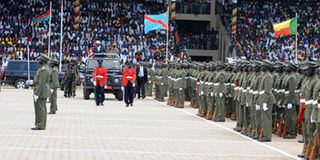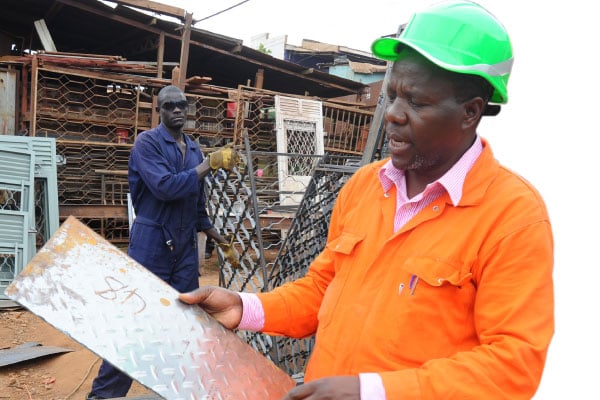Prime
400 desert UPDF: The inside story

President Museveni inspects a guard of honour at Kololo Independence Grounds recently. The high number of soldiers deserting the army has raised concerns among top military strategists. PHOTO BY FAISWAL KASIRYE
What you need to know:
* Some of them escaped with guns
* Most affected unit is that which guards President Museveni
* Many come from northern and eastern regions
* New recruits more “interested in money, not service”
Kampala
At least 400 Ugandan soldiers, among them 37 members of the presidential guards, responsible for protecting President Museveni, have deserted the army, one of Africa’s most respected militaries.
This is the highest number of reported desertions in the history of the Uganda People’s Defence Forces (UPDF), since 1995, when professionalisation of the national army commenced with the promulgation of the Constitution. Most of the deserters, according to available information, are from northern and eastern regions.
The SFC is the army’s crack unit, and its better-trained and better-armed troops have performed exceptionally when deployed on the most challenging and unique assignments within and outside the country. It is commanded by First Son, Brig. Muhoozi Kainerugaba, a graduate of both the UK’s Royal Military Academy Sandhurst and Fort Leavenworth Command and General Staff College in the United States.
Deserters’ list published
The UPDF’s decision to publicise the desertions earlier this week is unusual. It is traditionally secretive especially when it involves elite units like the SFC. In a lengthy investigation, the Daily Monitor has established that the unprecedented wave of desertions from the SFC, whose soldiers are famously proud of their unit, was linked to work details they had been asked to carry out.
Last August, SFC units were deployed from Mityana District to work on President’s Museveni’s Kisozi Ranch in Mpigi District. The first batch was made up of 120 soldiers from “A” Company. They were later replaced by another unit, which was withdrawn a fortnight ago. Some 37 soldiers in both groups, who complained of being subjected to hard labour; felling trees and clearing thickets on the ranch, had reportedly escaped by March, this year. Five of these deserters were captured in the past week and have been detained at SFC headquarters at Kasenyi in Entebbe, according to a highly-placed security source.
These include some of the individuals a Board of Enquiry chaired by Maj. William Atungwire dismissed with disgrace from the elite Force on Saturday, March 9, 2013. Deputy SFC commander, Col. Sabiiti Magyenyi, said desertions have always occurred in the military for various reasons.
Reasons for desertion
Soldiers deployed on the Kisozi Ranch were, he said, like while on any other assignments, responsible for clearing an observation zone to give them a vantage point to spot enemies. No SFC soldier had been taken off to do private work on the President’s farm, Col. Magyenyi said.
Another wave of desertions has come from ordinary army units, most of them drawn from northern and eastern regions. These units are central to the army’s battle operations in South Sudan and Somalia, where it is helping restore stability in the area and driving al Shabaab out of Mogadishu.
A private in the Ugandan army earns Shs310, 000 which compares with what, for instance, a police constable takes home. However, soldiers serving in the Special Forces earn an extra Shs150, 000 monthly as a food allowance. The rise in desertions, mostly involving ordinary soldiers from regular units, raises questions about the discipline and cohesion of the army credited for restoring civilian security, helping South Sudan achieve independence and beating al Shabaab out of Mogadishu.
Col. Felix Kulayigye, the army’s chief political commissar and spokesman, said: “We are concerned [about the desertions]. But a critical study of our population educates us that the young people who join the army come to look for jobs, and a job seeker is simply a wage seeker, and if the wage is not satisfactory to their expectations, they run away.
“Our assessment has been that a good number of recent entrants [into the army] are interested in jobs, not service [to the country]. There has also been a misunderstanding or misnomer that there is a lot of money in the army.”
Deployments on dangerous missions in difficult regions – such as the Karamoja sub-region and the Central African Republic – may explain some desertions, said Col. Kulayigye.
The Somalia impact
But it appears that some soldiers, who had been deployed to Somalia where they earned comparably higher pay, deserted when they returned to Uganda, probably to start up their businesses using the money they had saved on assignment.
The army has asked the public to help identify the deserters, some of whom took their weapons with them when they fled. Col Kulayigye, however, downplayed the dangers posed by so many guns in illegal hands.
But small arms such as AK-47 rifles that some of the deserters have fled with are, according to police accounts, the commonest weapons used in various fatal robbery and other shooting incidents in the capital, Kampala, and its residential outskirts this year.
There have been at least 45 reported shooting incidents in the country over the past three months, according to computations by this newspaper based on reported crime statistics. And on March 4, the UPDF said it foiled an attack on its Mbuya headquarters allegedly plotted by some of the recent army deserters, pointing to the dangers of illicit weapons. The Mbuya raid suspects are facing trial.
In 2006, the Special Presidential Brigade, the precursor outfit to SFC, inserted in units of UPDF’s 2nd Division and helped decimate Allied Democratic Front (ADF) rebels that had infiltrated Semiliki National Park to terrorise the population in western Uganda.
83 of 100 ADF fighters were killed, according to recollections of President Museveni, the Commander-In-Chief of the country’s armed forces. Before that, he noted, the Special Forces helped kill an “audacious gunner” of Joseph Kony’s rebels who had managed to damage some UPDF battle tanks (mambas) at the height of the Lord’s Resistance Army (LRA) insurgency in northern Uganda.
The President outlined these feats of SFC in a February 16, 2013 letter replying opposition politician Kizza Besigye, a retired Colonel, who in a February interview with this newspaper alleged that Brig. Muhoozi was “illegally” drafted into the army and that the Special Forces was created for him. In response, Gen. Museveni said SFC morphed from Chairman of the High Command guard group during NRA’s guerilla days.
The achievements of the UPDF, attributed to its disciplined troops, has made President Museveni popular with the West, which view him as an ally to ensure security in the Great Lakes region. An analysis of the list of deserters advertised by the army shows most of them hail from the northern and eastern regions, although we could not readily obtain an explanation for this pattern. There have been public complaints, and most recently in Parliament, about unequal treatments of soldiers from Uganda’s four geographical regions when it comes to promotions, trainings and deployments.
About the evolution of UPDF
The UPDF evolved from the National Resistance Army (NRA) rebel group that deposed Gen. Tito Okello Lutwa’s junta. Yoweri Museveni, who was NRA commander, became President and Commander-in-Chief of Uganda’s armed forces on January 26, 1986.
The Ugandan military comprises about 50,000 troops and is structured into the Land Forces, Air Forces, Reserve Force and Special Forces. First Son Muhoozi Kainerugaba commands the 10, 000-strong Special Forces considered the vanguard of UPDF. It has eleven battalions. The Special Forces are responsible for the security of the President and the Vice, sensitive national installations including the oil wells and other demanding, specialised operations.
Ugandan troops overall are admired worldwide for their discipline, professionalism and dedication including while on international peace missions.
UPDF’s predecessor, the NRA, fought alongside Rwanda Patriotic Front (RPF) rebels to liberate Rwanda in 1994; the Ugandan army undertook a similar mission resulting in South Sudan’s independence, and in 2007, spearheaded the African Union Peace-keeping Mission in Somalia that helped flush the al Shabaab out of Mogadishu.
These successes of the UPDF have endeared President Museveni to the West, making him an essential partner on regional peace and security. The reported desertions, which manifest the soldiers’ indiscipline, has their bosses worried.




